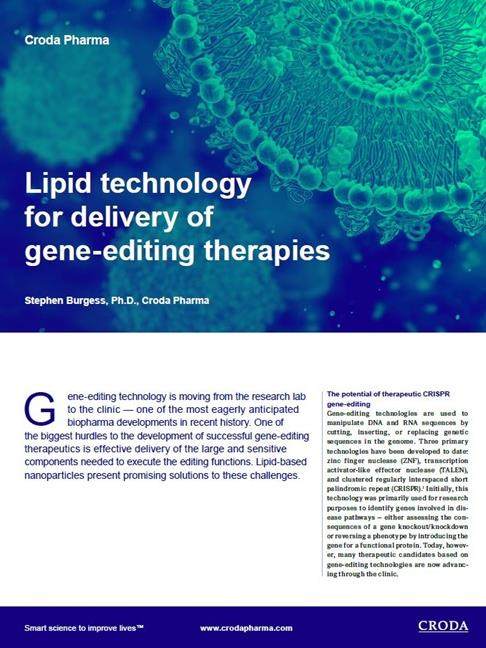Precision medicine revolution: The potential of DSPE-RGD in targeted drug delivery
DSPE-RGD: targeted drug delivery for precision medicine
In recent years, researchers and clinicians have been exploring new ways to deliver drugs directly to the cells and tissues that need them, while minimizing side effects on healthy cells. One of the most promising biomaterials in this area is DSPE-RGD, a liposome-based material that has been modified to incorporate the RGD peptide sequence.
WHITEPAPER: Lipid technology for delivery of gene-editing therapies

DSPE-RGD has the potential to revolutionize targeted drug delivery, enabling researchers and clinicians to develop more effective and personalized treatments. In this blog, we'll explore the potential of DSPE-RGD in medicine, including its applications in cancer treatment, cardiovascular disease, and inflammatory diseases. Join us as we delve into the fascinating world of biomaterials and precision medicine!
What is DSPE-RGD?
DSPE-RGD is a lipid that can be used in liposomes, which is a tiny, spherical particle made up of a lipid bilayer. Liposomes have been used for drug delivery since the 1970s, but DSPE-RGD is a newer, more advanced version that has been modified with the RGD peptide sequence.
The RGD peptide sequence stands for arginine-glycine-aspartic acid, and it is a short chain of amino acids that can bind to integrin receptors on the surface of cells. Integrin receptors are found on a variety of cells, including cancer cells and cells in blood vessels.
It is biocompatible, which means it is unlikely to cause an immune response or significant toxicity in the body. This is an important characteristic for any bio-material that is intended for use in humans.
Effect in chemotherapy
DSPE-RGD has been shown to increase the accumulation of drugs in tumor tissue, which can improve the effectiveness of chemotherapy and other cancer treatments. It has also been shown to reduce the toxicity of these treatments in healthy cells.
Traditional chemotherapy drugs are often distributed throughout the body, which can cause significant side effects in healthy tissues. However, with the targeted approach of DSPE-RGD liposomes, drugs can be delivered specifically to tumor tissue, reducing the negative impact on healthy cells.
Research has shown that DSPE-RGD liposomes can improve the effectiveness of chemotherapy drugs by increasing their accumulation in tumor tissue. For example, a study published in the journal Biomaterials in 2011 found that DSPE-RGD liposomes loaded with the chemotherapy drug doxorubicin could accumulate in tumor tissue in mice, leading to a significant reduction in tumor growth compared to conventional doxorubicin treatment.
Another study published in the Journal of Controlled Release in 2012 found that DSPE-RGD liposomes loaded with the chemotherapy drug paclitaxel could selectively accumulate in tumor tissue in rats, leading to improved efficacy and reduced toxicity compared to conventional paclitaxel treatment.
DSPE-RGD has potential applications in a wide range of medical fields, including cancer treatment, cardiovascular disease, and inflammatory diseases. Its ability to target specific cells or tissues could enable the development of more personalized and effective treatments.
DSPE-RGD for targeted drug delivery
Biomaterials have become an essential tool in medicine, enabling researchers and clinicians to develop advanced therapies and treatments. One exciting biomaterial that has been gaining attention is DSPE-RGD, a liposome-based material that has been modified to incorporate the RGD peptide sequence.
In a recent study published in the journal Pharmaceutical Research, researchers demonstrated that DSPE-RGD has the potential to revolutionize targeted drug delivery. Liposomes are already a promising platform for drug delivery due to their biocompatibility and ability to encapsulate a wide range of drugs. However, liposomes are often taken up by cells nonspecifically, limiting their effectiveness in targeted drug delivery.
That's where DSPE-RGD comes in. By incorporating the RGD peptide sequence, DSPE-RGD liposomes are able to specifically bind to integrin receptors on the surface of cells. These receptors are overexpressed in certain types of cancer cells and other diseased tissues, making DSPE-RGD an ideal candidate for targeted drug delivery.
In their study, the researchers showed that DSPE-RGD liposomes were able to target and deliver drugs specifically to cells that express integrin receptors. They also demonstrated that DSPE-RGD liposomes were biocompatible and did not cause significant toxicity in vitro or in vivo. These findings suggest that DSPE-RGD has the potential to significantly improve the efficacy of treatments while reducing side effects.
Potential applications of DSPE-RGD
DSPE-RGD is a promising biomaterial with a wide range of potential applications.
Cancer treatment
One of the most exciting applications is in the field of cancer treatment. Cancer cells often overexpress integrin receptors, making them an ideal target for DSPE-RGD liposomes. By delivering drugs directly to cancer cells, DSPE-RGD could help to overcome issues with drug resistance and reduce the negative impact on healthy cells.
Cardiovascular diseases
Another potential application for DSPE-RGD is in the treatment of cardiovascular diseases. The RGD peptide sequence can also target integrin receptors on the surface of cells in blood vessels. This could enable the delivery of drugs directly to damaged blood vessels, promoting repair and reducing the risk of complications such as heart attack or stroke.
Inflammatory diseases
DSPE-RGD could also be used in the treatment of inflammatory diseases, such as rheumatoid arthritis. Inflammatory cells also express integrin receptors, making them a potential target for DSPE-RGD liposomes. By delivering anti-inflammatory drugs directly to these cells, DSPE-RGD could help to reduce inflammation and alleviate symptoms.
Other health conditions
In addition to these applications, DSPE-RGD has the potential to be used in a wide range of other diseases and conditions. Its ability to target specific cells or tissues could enable the development of more personalized and effective treatments. Furthermore, DSPE-RGD is biocompatible and does not cause significant toxicity, making it a safe and promising biomaterial for clinical use.
Overall, DSPE-RGD represents a major breakthrough in the field of targeted drug delivery. With its potential to deliver drugs specifically to diseased cells or tissues, it has the potential to significantly improve the efficacy of treatments while reducing side effects. If further research supports its safety and efficacy, DSPE-RGD could become an essential tool in the fight against a wide range of diseases and conditions.
A final word
As with any new biomaterial, further research will be needed to fully evaluate the safety and efficacy of DSPE-RGD in various applications. However, the potential of DSPE-RGD is clear. This biomaterial has the potential to be a game-changer in the field of targeted drug delivery, enabling researchers and clinicians to develop more effective and personalized treatments.
In conclusion, DSPE-RGD represents an exciting development in the field of biomaterials and targeted drug delivery. With its ability to target specific cells or tissues, it has the potential to make a significant impact on the treatment of a variety of diseases. If you're interested in the future of medicine, keep an eye on DSPE-RGD!

